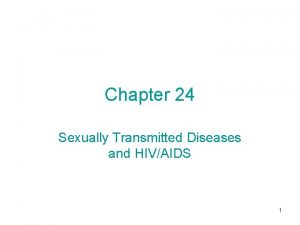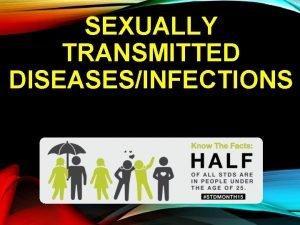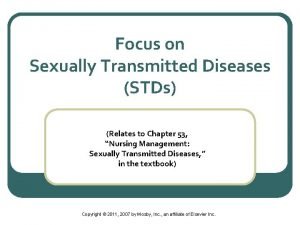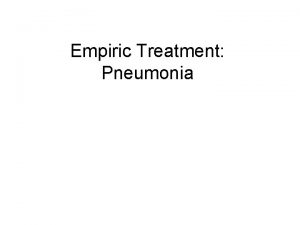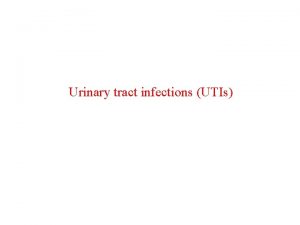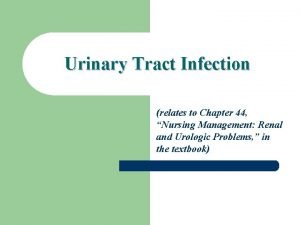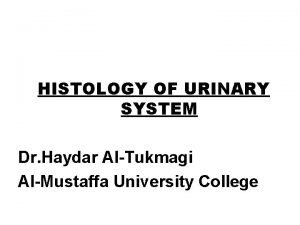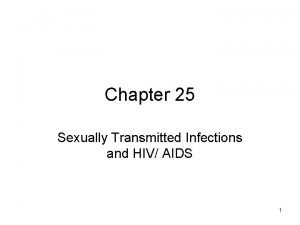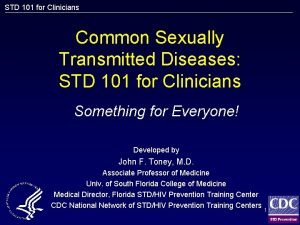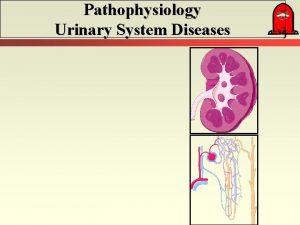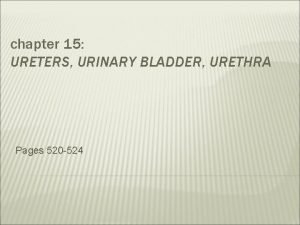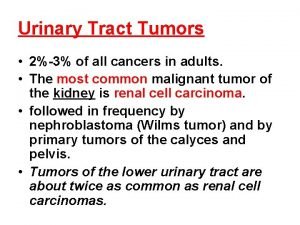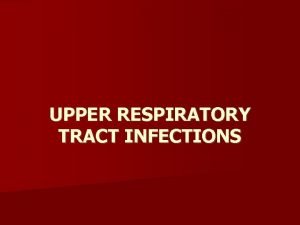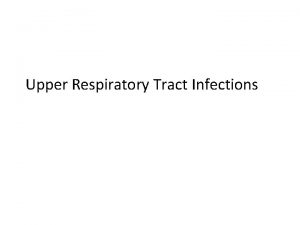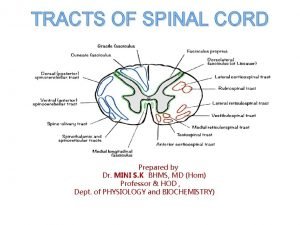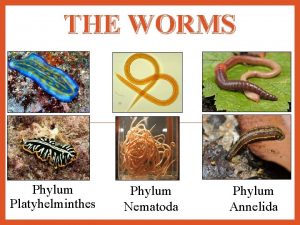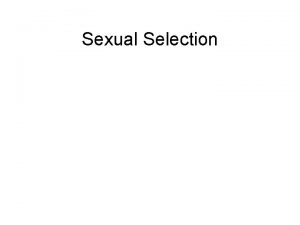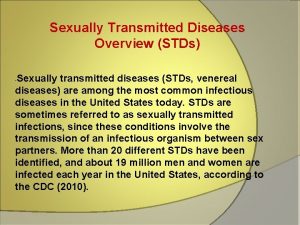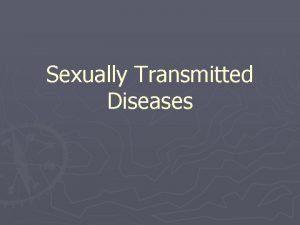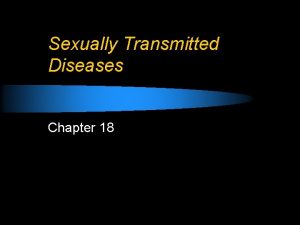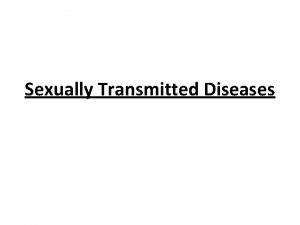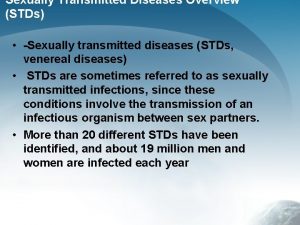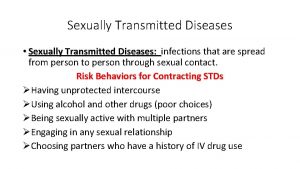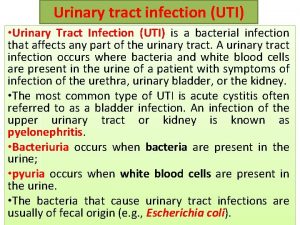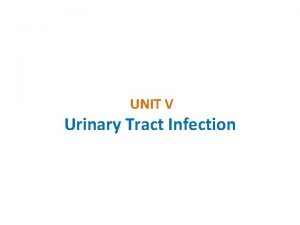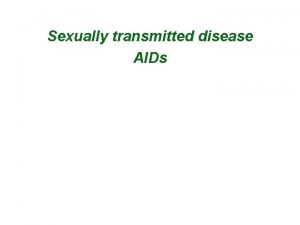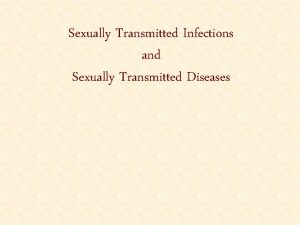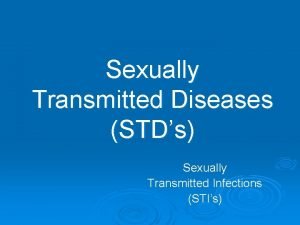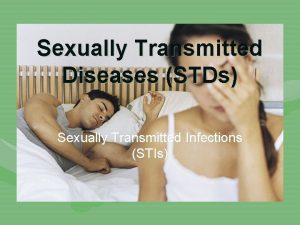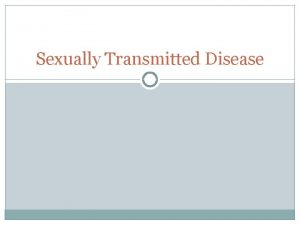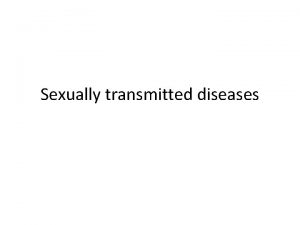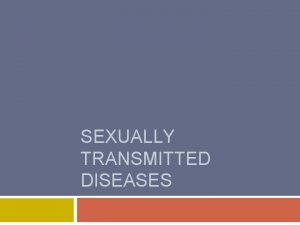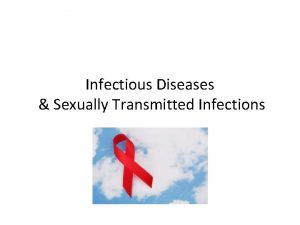Urinary Tract Infection and Sexually Transmitted Diseases Prof






















- Slides: 22

Urinary Tract Infection and Sexually Transmitted Diseases Prof. R. K. Dixit Pharmacology and Therapeutics K. G. M. U. Lucknow dixitkumarrakesh@gmail. com


Urinary Tract Infection Pyelonephritis Upper UTI Ureteritis Vesico-ureteral Reflux Lower UTI Cystitis Urethritis

• Upper Urinary tract (Kidney, Ureter) • Less common but More dangerous, • Long term therapy • Lower Urinary tract (Bladder, Urethra) • More common but Less dangerous • Short term therapy

• Organisms • Mostly Gram Negative (E. coli, Klebsiella, Proteus, Pseudomonas, Enterobacter, ) • Others- Staphylococcus, Viral, Fungal, … • Single in acute, mixed in chronic • Entry • Mostly from lower to upper (Ascending ), • Some times • Directly from the surrounding sites or • From blood (bacterimia)

Symptoms

Symptoms- (Severe Pain During UTI) • Systemic symptoms- myalgia, vomiting, weakness etc. • Pain (Pelvic, Rectal, lower abdomen or renal angle) • Pungent smell of urine • Dysuria (Burning), • Denies urination (Fear of Urination) • Discharge through urethra • Discoloration of urine • Urgency • Temperature (Fever with chills) • Incomplete emptying (Retention) • Incontinence of urine (Haematuria, Pyuria, Haziness, Clouding)

• More common in Females- Anatomical differences • Other part involved • Prostate, Epididymis • More common if- • Stones • Strictures • Stents (Urinary Catheter) • Structural abnormality • Straight entry of ureter • Sexually active • Store urine (Faulty urinary habit) • Surgical (abdomen) • Scanty fluid intake • Semiconscious (Unconscious), • Site trauma,

Treatment of UTI • Increased Fluid Intake and Voiding • Analgesics, Antipyretics, Anti-inflammatory (NSAIDs) • Alteration of p. H • Alkalizers – Potassium Citrate, Baking Soda, • Beware of • Dilution (1: 10) of syrup (Gastric irritant)- 30 ml in 300 ml • Not with Nalidixic acid, Nitrofurantoin, Methenamine • Proteus which split urea and produce ammonia and make urine alkaline. Acidify with vitamin C, Mandelic acid (Syrup of Ammonium Mandelate) and Cranberry (Karaunda)

• Urinary analgesics (Local)- • Phenazopyridine (Symptomatic relief only, No antibacterial property, Urine becomes orange red) • Urinary antiseptics- • Nitrofurantoin • Generates nitro-anion superoxide to damage bacterial DNA, • Dark brown urine, • Peripheral neuritis, Intra-hepatic cholestasis • Antagonism with Nalidixic acid • Methenamine – • Releases formaldehyde in acidic urine, • Antagonism with sulfonamides

Antimicrobials------------(Q-BACTS) • Quinolones -(Nalidixic acid, Norfloxacin……) • Betalactams- Ampicillin/ Amoxicillin, • Aminogycosides- Gentamicin, Amikacin, … • Cephalosporins- Third generation • Tetracyclines • Sulfonamides and Cotrimoxazole • Other Antimicrobials • Chloramphenicol, Methicillin, Carbenicillin etc……. .

• Prophylaxis for UTI- Needed in • Catherised, • Uncorrectable anatomical abnormalities • Inoperable prostate, • Septicemia, • Immuno-compromised, • Trauma • Note- • In patients with impaired renal functions avoid • Nitrofurnatoin, Nalidixic acid, • Aminoglycosides, • Potassium salt, and Acidifying agents

V V V

Sexually Transmitted Diseases (STD) (Sexually Transmitted Infections (STI) • Transmitted through sexual contacts • Usual Presentations – Genital ulcers – Discharge (Urethral and vaginal) – Abdominal Pain – Swelling surrounding genital area – Systemic symptoms (Fever, weakness etc. )

• Important STDs – – Syphilis (Chancre (Hard sore, Painless) Chancroid (Soft sore, Painful) Gonorrhea Non-gonococcal urethritis (Nonspecific) • Chlamydia, Ureoplasma, Haemophillus, Mycoplasma – – – – Herpes genitalis AIDS (HIV) Hepatitis B Donovaniasis Trichomoniasis Wart (Genital Wart, Human Papilloma Virus strain 6 and 11) Pubic Lice Lymphogranuloma inguinalae

üChancroid Clean üHerpes genitalis HAND üHepatitis B üAIDS (HIV) With üNon-gonococcal urethritis Soap üDonovaniasis üWart (genital) To üSyphilis Loose üTrichomoniasis üLymphogranuloma inguinalae Germs üLice üGonorrhea

DISEASES DRUG OF CHOICE 1. Neisseria gonorrhoea ( gonococcus) 2. Syphillis -Primary( chancre) Early Ceftriaxone 250 mg I. M/ Azithromycin/ Doxycycline Amoxicillin/ Cefixime/Ciprofoxacin (Single dose) Procaine Penicillin-G 2. 4 M. U. daily for 10 to 14 days or Benzathine penicillin G 2. 4 M. U Once -Secondary (Condeloma Lata) -Latent (< 1 yr) - Latent (>1 yr) or -cardiovascular syphillis -Tertiary -Neurosyphillis Benzathine penicillin G 2. 4 M. U. weekly for 3 weeks or Procaine Penicillin G 2. 4 M. U. for 3 weeks

DISEASES DRUG OF CHOICE Herpes simplex Acyclovir/ Valacyclovir 4. (Non specific urethritis) Lymphogranuloma venereum Chalmydiae trachomatis Doxycycline 100 mg BD for three weeks or Azithromycin 1 gm oral per week for three weeks 5. Donovanosis (Calymmatobacterium granulomatis) Granuloma Inguinale Azithromycin 1 g per week for 3 weeks or Doxycycline 100 mg BD for 3 weeks 3. Chancroids 6. (Haemophilus ducreyi) Azithromycin 1 g oral single dose Or Ceftriaxone 250 mg I. M sing dose or Erythromycin 500 mg QID for one week

7. Condyloma acuminatum • Human Papilloma Virus strain 6 and 11 Treatment Antiviral therapy: Interferon, Valaciclovir üRegional treatment : Podophyllotoxin üLaser, freezing (Cryosurgery) üMicrowave üBig wart: excise by operation Remember it ‘s different: To Condyloma lata- Secondary Syphilis

8. Hepatitis 9. B- Lamivudine HIV- Zidovudine and other ART

STDs are Very BAD • Valacyclovir (Acyclovir) - Herpes genitalis, Genital Warts • Betalactams – Penicillins- Syphilis – Ceftriaxone - Gonorrhea • Azithromycin - Chancroid • Doxycycline- Chlamydia, Donovanosis, Gonorrhea

 Chapter 24 sexually transmitted diseases and hiv/aids
Chapter 24 sexually transmitted diseases and hiv/aids Chapter 24 lesson 1 sexually transmitted diseases
Chapter 24 lesson 1 sexually transmitted diseases Sti std
Sti std Nursing management of reproductive tract infection
Nursing management of reproductive tract infection Urinary tract infection
Urinary tract infection Complicated urinary tract infection
Complicated urinary tract infection Urinary tract infection in pregnancy ppt
Urinary tract infection in pregnancy ppt Nursing management for urinary tract infection
Nursing management for urinary tract infection Uti causes
Uti causes A bacterial std that usually affects mucous membranes
A bacterial std that usually affects mucous membranes Sexually transmitted disease
Sexually transmitted disease Histological structure of kidney
Histological structure of kidney Anatomy of the urinary tract
Anatomy of the urinary tract Tumor in the urinary tract
Tumor in the urinary tract Classification of upper respiratory tract infection
Classification of upper respiratory tract infection Conclusion of respiratory tract infection
Conclusion of respiratory tract infection Pyramidal vs extrapyramidal
Pyramidal vs extrapyramidal Rubrospinal tract
Rubrospinal tract Spongia officinalis
Spongia officinalis How do whales reproduce sexually
How do whales reproduce sexually Flatworm asexual reproduction
Flatworm asexual reproduction Parasitism phylum
Parasitism phylum Run away selection
Run away selection
